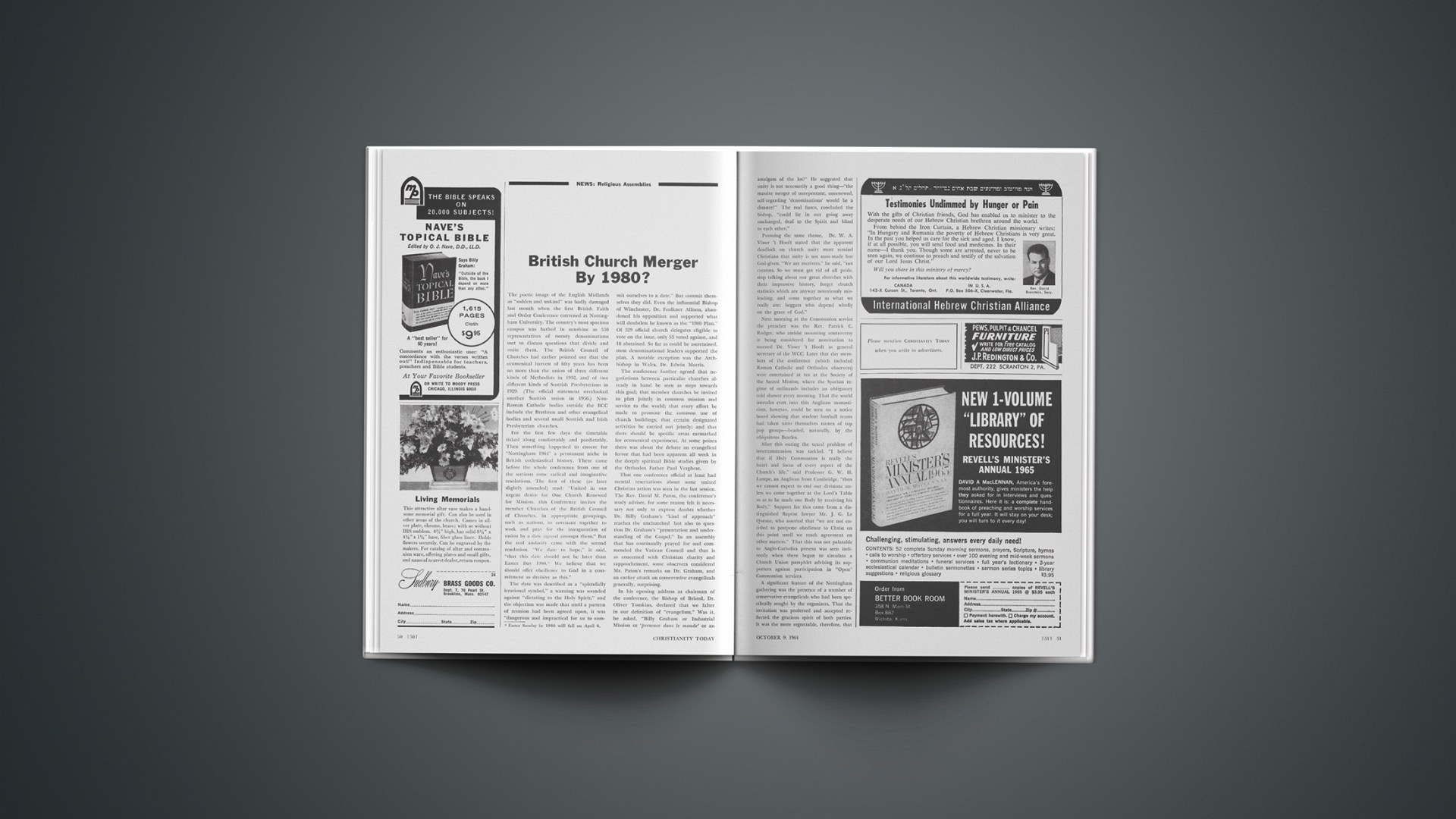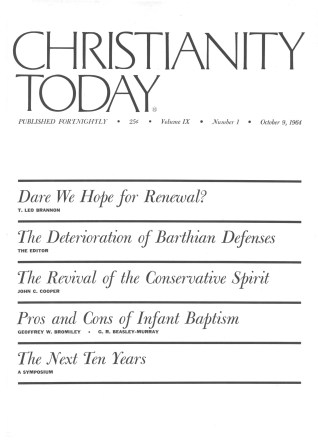The poetic image of the English Midlands as “sodden and unkind” was badly damaged last month when the first British Faith and Order Conference convened at Nottingham University. The country’s most spacious campus was bathed in sunshine as 550 representatives of twenty denominations met to discuss questions that divide and unite them. The British Council of Churches had earlier pointed out that the ecumenical harvest of fifty years has been no more than the union of three different kinds of Methodists in 1932, and of two different kinds of Scottish Presbyterians in 1929. (The official statement overlooked another Scottish union in 1956.) Non-Roman Catholic bodies outside the BCC include the Brethren and other evangelical bodies and several small Scottish and Irish Presbyterian churches.
For the first few days the timetable ticked along comfortably and predictably. Then something happened to ensure for “Nottingham 1964” a permanent niche in British ecclesiastical history. There came before the whole conference from one of the sections some radical and imaginative resolutions. The first of these (as later slightly amended) read: “United in our urgent desire for One Church Renewed for Mission, this Conference invites the member Churches of the British Council of Churches, in appropriate groupings, such as nations, to covenant together to work and pray for the inauguration of union by a date agreed amongst them.” But the real audacity came with the second resolution. “We dare to hope,” it said, “that this date should not be later than Easter Day 1980.1Easter Sunday in 1980 Will fall on April 6. We believe that we should offer obedience to God in a commitment as decisive as this.”
The date was described as a “splendidly irrational symbol,” a warning was sounded against “dictating to the Holy Spirit,” and the objection was made that until a pattern of reunion had been agreed upon, it was “dangerous and impractical for us to commit ourselves to a date.” But commit themselves they did. Even the influential Bishop of Winchester, Dr. Feolkner Allison, abandoned his opposition and supported what will doubtless be known as the “1980 Plan.” Of 329 official church delegates eligible to vote on the issue, only 53 voted against, and 18 abstained. So far as could be ascertained, most denominational leaders supported the plan. A notable exception was the Archbishop in Wales, Dr. Edwin Morris.
The conference further agreed that negotiations between particular churches already in hand be seen as steps towards this goal; that member churches be invited to plan jointly in common mission and service to the world; that every effort be made to promote the common use of church buildings; that certain designated activities be carried out jointly; and that there should be specific areas earmarked for ecumenical experiment. At some points there was about the debate an evangelical fervor that had been apparent all week in the deeply spiritual Bible studies given by the Orthodox Father Paul Verghese.
That one conference official at least had mental reservations about some united Christian action was seen in the last session. The Rev. David M. Paton, the conference’s study adviser, for some reason felt it necessary not only to express doubts whether Dr. Billy Graham’s “kind of approach” reaches the unchurched but also to question Dr. Graham’s “presentation and understanding of the Gospel.” In an assembly that has continually prayed for and commended the Vatican Council and that is so concerned with Christian charity and rapprochement, some observers considered Mr. Paton’s remarks on Dr. Graham, and an earlier attack on conservative evangelicals generally, surprising.
In his opening address as chairman of the conference, the Bishop of Bristol, Dr. Oliver Tomkins, declared that we falter in our definition of “evangelism.” Was it, he asked, “Billy Graham or Industrial Mission or ‘presence dans le monde’ or an amalgam of the lot?” He suggested that unity is not necessarily a good thing—“the massive merger of unrepentant, unrenewed, self-regarding ‘denominations’ would be a disaster!” The real fiasco, concluded the bishop, “could lie in our going away unchanged, deaf to the Spirit and blind to each other.”
Pursuing the same theme, Dr. W. A. Visser’t Hooft stated that the apparent deadlock on church unity must remind Christians that unity is not man-made but God-given. “We are receivers,” he said, “not creators. So we must get rid of all pride, stop talking about our great churches with their impressive history, forget church statistics which are anyway notoriously misleading, and come together as what we really are: beggars who depend wholly on the grace of God.”
Next morning at the Communion service the preacher was the Rev. Patrick C. Rodger, who amidst mounting controversy is being considered for nomination to succeed Dr. Visser’t Hooft as general secretary of the WCC. Later that day members of the conference (which included Roman Catholic and Orthodox observers) were entertained at tea at the Society of the Sacred Mission, where the Spartan regime of ordinands includes an obligatory cold shower every morning. That the world intrudes even into this Anglican monasticism, however, could be seen on a notice board showing that student football teams had taken unto themselves names of top pop groups—headed, naturally, by the ubiquitous Beatles.
After this outing the vexed problem of intercommunion was tackled. “I believe that if Holy Communion is really the heart and focus of every aspect of the Church’s life,” said Professor G. W. H. Lampe, an Anglican from Cambridge, “then we cannot expect to end our divisions unless we come together at the Lord’s Table so as to be made one Body by receiving his Body.” Support for this came from a distinguished Baptist lawyer Mr. J. G. Le Quesne, who asserted that “we are not entitled to postpone obedience to Christ on this point until we reach agreement on other matters.” That this was not palatable to Anglo-Catholics present was seen indirectly when there began to circulate a Church Union pamphlet advising its supporters against participation in “Open” Communion services.
A significant feature of the Nottingham gathering was the presence of a number of conservative evangelicals who had been specifically sought by the organizers. That the invitation was proferred and accepted reflected the gracious spirit of both parties. It was the more regrettable, therefore, that BCC officials should have commissioned a liberal theologian to read the evangelicals a blunt lecture on the ecumenical difficulties they presented. The project was badly conceived, and executed without a trace of redeeming winsomeness. The chosen instrument was the secretary-elect of the Congregational Union of England and Wales, the Rev. John Huxtable. His delineation of conservative evangelical attitudes faithfully recorded their “notorious” non-cooperation with “second-class Churchmen,” showed an imperfect acquaintance with their theological position, and attributed to all of the party the self-righteous extremism undoubtedly found in a minority.
While expressing sympathy with those church members who think of unity as “a grisly ecclesiastical monster,” Professor J. Robert Nelson of the Graduate School of Theology, Oberlin, Ohio, felt that such an attitude was retrogressive. “The implications of God’s work of reconciliation in Christ for the historic life and mission of the Church,” suggested the American Methodist, might show the unity movement to be, not “a monstrous threat,” but “a veritable opportunity for a more faithful Christian life.”
Council At St. John’s
Although the denomination’s new Sunday school curriculum has stirred a nation-wide controversy, delegates to the twenty-first General Council of the United Church of Canada did not make an issue of it. The delegates were presented with a report of the controversy, and an abbreviated explanation was given on the floor, but no questions were raised. Evangelicals have charged that the curriculum rejects the validity of certain cardinal doctrines.
The General Council was held in the historic city of St. John’s, Newfoundland. Some 396 delegates were on hand. (The denomination was an outgrowth of a 1925 merger embracing Congregationalists, Methodists, and some Presbyterians.)
The Rt. Rev. James R. Mutchmor, retiring moderator, said in his farewell address that he has “a very limited regard for an episcopally-governed church.” “Church statistics clearly show,” he declared, “that North American non-Roman Catholic communions which hold firmly to the doctrine of the apostolic succession are numerically declining bodies. They are extremely weak in rural North America and count for little in the villages and small towns of this continent.”
The rejoinder to the outspoken Mutchmor came from the Rev. R. H. N. Davidson, one of the church’s Committee of Ten that has been discussing union with ten Anglican counterparts. He suggested a resolution asking that the office of bishop be introduced into the presbyterian-designed United Church. The motion was deferred for further study and discussion. Talks on union have gone on intermittently between the two denominations many years.
Endorsement From Canada
Delegates to the triennial convention of the Baptist Federation of Canada voted to participate in the proposed North American Fellowship of the Baptist World Alliance. A resolution approved by the convention in Wolfville, Nova Scotia, hailed “the efforts toward Baptist unity in North America” and affirmed the Canadian federation’s desire to be a part of the proposed cooperative program for seven Baptist bodies. The program is aimed at continuing relations established in the Baptist Jubilee Advance (1959–1964).
‘The Doctor Should Also Pray’
The first “Christian Healing Hospital,” opened last May in Medford, Oregon, by the evangelically oriented Christian Medical Foundation, is so far living up to its founders’ expectations.
Dr. William Standish Reed, a surgeon and president of the foundation, said at the annual meeting of the International Conference on Christian Healing in Philadelphia last month that the new venture will combine medical treatment with a spiritual healing ministry in order to “convince people to pray, and then see their doctor, who should also pray.”
The Christian doctors who staff the 102-bed hospital will seek both to show that spiritual healing has a legitimate place and to reach those who believe that it is “slapping God in the face to go to a doctor.” The hospital is designed to provide “an atmosphere of faith and belief, from the people who mop up the floor to the medical and nursing staff,” Reed said. There was some indication that the “atmosphere of faith” had aided recuperation in several cases, he added.
The Conference on Christian Healing is sponsored by the Episcopal Order of St. Luke the Physician, a non-monastic healing order that helps to support the foundation. Besides the hospital, the foundation operates a clinic in Tampa, Florida, and plans more hospitals in other parts of the country.
The new approach, combining the physical, mental, and spiritual makeup of man, and variously referred to as “thymo-psychosomatic” (“thymo-” for spirit) and “logiatry,” has not attracted much attention in the United States, but is being “commonly discussed in Europe,” said Reed. He mentioned Dr. Paul Tournier as being one of the European pioneers in the field.










